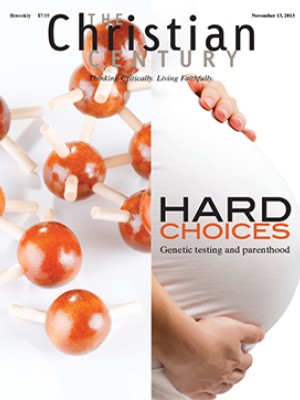Church news outlets struggle to maintain editorial independence
The closing of several Protestant denominational newspapers, magazines and other news services has played a part in eroding the standards of professional religious journalism, according to members of the Associated Church Press.
As denominational news services contend with fiscal challenges that have beset secular media as well, church press officials worry that these outlets have lost their editorial independence and are increasingly performing a public relations role for their denominations.
“There has been a strong commitment on the part of many denominations to promote religious journalism that lives up to the standards of what professional journalism should be,” said Meinrad Scherer-Emunds, chair of the ACP Religious Journalism Task Force. “We feel that has been limited in more recent years.”
Read our latest issue or browse back issues.
Jay Voorhees, executive editor of the United Methodist Reporter, bought the digital assets of the publication after it ceased publication in May when UMR Communications closed after months of financial losses.
Voorhees now runs it as a much smaller, web-only publication. He and a few others work on the publication part-time, hoping to continue the newspaper’s legacy.
“We still think there is an important need for a voice in the Methodist Church that is independently operated from the official Methodist structure,” Voorhees said. “The reality is that it’s very, very difficult to find a funding model that will allow for independent journalism that is not simply regurgitating what is coming out in press releases from denominational agencies.”
Voorhees said many church publications are based on print models, which are no longer financially viable. “I think it’s going to be difficult for these organizations to respond to these changes that are required by this new world that we live in,” Voorhees said.
Publications that have shut their doors include the Progressive Christian, Episcopal Life, United Church News and the Church Herald.
Joe Thoma, executive director of the ACP, said his organization has seen a “significant change” in its membership as news services contract. Many denominations have resorted to telling the “good news” only, Thoma said.
Verity Jones, executive director of the Center for Pastoral Excellence at Christian Theological Seminary in Indianapolis, said this shift toward public relations led the ACP, which has more than 100 member organizations, to write a statement affirming religious journalism.
“We were seeing the eroding of support for and trust in an independent voice within traditions and denominations reporting the news,” said Jones, a former editor of DisciplesWorld, which ceased publication in 2010.
“It’s not optional, because the free exchange of ideas is central to the living out of Christian community. It’s important for accountability; it’s important for news sharing.” Jones, who serves on the board of Religion News Service, added that sometimes news is not good for a denomination, pointing to scandals involving clergy sexual abuse of minors as an example. —RNS
This article was edited on October 28, 2013.





